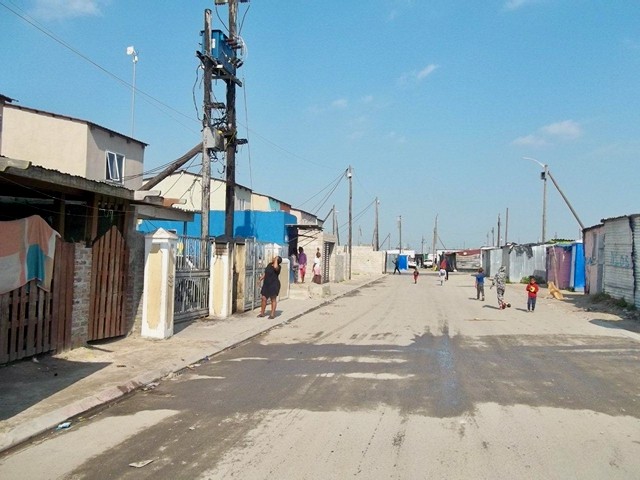Delft families waiting for years to have electricity restored
Power outage blamed on illegal connections at Tsunami informal settlement
Community leader Nosicelo Bobi shows the transformer in Devilwood Crescent, Delft, that exploded two years and six months ago. Over 80 families are without electricity. Photo: Vincent Lali
- Over 80 families in Delft, living in RDP houses, are without electricity.
- A resident says they lost power when an Eskom transformer exploded two years and six months ago.
- The community, Eskom and the City of Cape Town blame illegal connections made by residents of Tsunami informal settlement.
- Delft residents say they have been told they will only get their electricity back when Tsunami is electrified.
Over 80 families in RDP houses in Delft are without electricity due to illegal connections. This has been the situation for almost three years, according to community leader Nosicelo Bobi.
The families moved from temporary houses in nearby Tsunami informal settlement to RDP houses in 2009 and 2010. Subsequently, shack dwellers in Tsunami stole cables, cutting off their power, and also connected illegally to transformers, which caused power outages for the formal houses. Bobi also blamed the illegal connections for burning out municipal electricity meters and people’s electric appliances, such as TVs, fridges and stoves.
“We no longer get electricity,” said Bobi. “We now pay R5 to charge our cell phones at Somali-owned shops which still have access to electricity.” This is so that her four children can do their online school work. She said it was a struggle. She also uses gas to cook and boil water to bath.
Bobi said that at a meeting with City of Cape Town and Eskom officials in the Delft Library three weeks ago, they were told that power would only be restored once Tsunami was electrified.
Nokwakha Shinya showed GroundUp her burnt-out electricity meter box. She said it melted in 2018.
Without electricity she has to “hire youngsters for R20 to collect firewood from the forest”.
She stays with eight grandchildren. She is unemployed and they live off child support grants. Without electricity and light at night the children are also struggling to do their schoolwork. Using alternatives to electricity is costing more than the family can afford.
Near Mkhululi Njukutya’s gate, a damaged transformer stands on a pole. He said it exploded two years and six months ago. He wants Eskom to remove it.
Tsunami community leader Kwanele Mcaleni said, “It’s a disgrace for Eskom and the City of Cape Town that we still don’t have electricity despite the fact that Tsunami has been around for almost 11 years.”
Mcaleni said some shack dwellers pay R1,000 monthly to get electricity from RDP houses.
Mayco Member for Human Settlements Councillor Malusi Booi said, “This is a complex situation, and the City, Eskom and the Western Cape government are looking into it as it entails a redevelopment subject to funding, space and relocation.
“This area is in an Eskom supplied area and it is characterised by intense illegal connections that affect the electricity supply to parts of the broader area, including parts of the settlement.”
Eskom spokesperson Kyle Cookson said, “Eskom is working with the Western Cape provincial government and their appointed developers to finalise electrification of a Temporary Relocation Area in order to relocate some Tsunami occupants.”
Next: PRASA promises to fix Pretoria’s collapsing train stations
Previous: Health department takes vaccination drive to taxi rank
© 2021 GroundUp. This article is licensed under a Creative Commons Attribution-NoDerivatives 4.0 International License.
You may republish this article, so long as you credit the authors and GroundUp, and do not change the text. Please include a link back to the original article.
We put an invisible pixel in the article so that we can count traffic to republishers. All analytics tools are solely on our servers. We do not give our logs to any third party. Logs are deleted after two weeks. We do not use any IP address identifying information except to count regional traffic. We are solely interested in counting hits, not tracking users. If you republish, please do not delete the invisible pixel.



